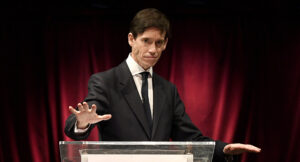It was Halloween on Tuesday, and over at the Covid Inquiry the party theme for witnesses seemed to be “Nineties crime movie”. Though the presumed intention of Dominic Cummings was to appear suitably funereal, in his white shirt and skinny black tie he put one in mind of an extra from Reservoir Dogs. And with exposure to his profanity-strewn emails and private messaging, spectators were plunged into a retro world of adolescent play-acting — quite possibly due to its protagonists watching too many mob movies at a formative age.
The preferred idiom was very sweary. According to Cummings’s communications from 2020, government ministers and civil servants dealing with the Covid crisis were “useless fuckpigs”, “morons”, and “cunts”. Everyone mentioned seemed to have a nickname, as if planning a heist: “Sonic” the Hedgehog Special Advisor; “Frosty” the Snowman Minister of State at the Cabinet Office; “Trolley” the Problem Prime Minister, and so on.
Sexist bravado also apparently abounded, with Cummings threatening, in one exchange with Trolley and Director of Communications Lee Cain, to “personally handcuff” Deputy Cabinet Secretary Helen MacNamara and “escort her from the building”. In cadences reminiscent of a made man arranging concrete shoes for a troublesome foot soldier, Cummings continued: “We gotta get Helen out of [the Cabinet Office] She’s fucking up Frosty. She’s fucking up me and Case. She’s trying to get spads fired and cause trouble on multiple fronts. Can we get her in Monday for chat re her moving to [the Ministry of Housing, Communities, and Local Government] … we need her out ASAP. Building millions of lovely houses.”
Yet in the flesh at the Inquiry, Cummings was more penitent schoolboy than would-be gangster, apologising repeatedly for his previous “terrible” and “appalling” language. And the contrast was also stark with his written submission, in which, as others have also noted, he came across more like Adrian Mole than Harvey Keitel. (A characteristically mournful extract: “Although I was/am often described as ‘all powerful’ in No 10 in 2020 this is false and very misleading regarding Covid… For example, in January 2020 I could not even stop Chris Grayling being appointed by the PM to chair the Commons intelligence committee”.)
Equally, when the next day MacNamara herself appeared at the Inquiry, giving us first sight of Cummings’s much-maligned female nemesis, the deep histrionics running through his communications about her became even more discernible. For if his own fictional lodestar seems to be Nineties Tarantino films, MacNamara’s seems to be Bridget Jones Diary — even down to the fact of having once brought a karaoke machine to a lockdown party at Downing Street.
Though appearing calm and self-assured on the stand, MacNamara’s reported messages to fellow officials seemed almost parodically self-deprecating and tentative — perhaps partly due to the calibre of the individuals she was dealing with at the time. One email to the Cabinet Secretary from 2020 about the inadequate fit of most PPE with female bodies started with the words “Just when you thought you were out of the woods on annoying emails from me” and closed with “I didn’t know who to annoy with this so chose you”. She signed off with a fist emoji but immediately felt the need to explain, quasi-humorously: “that’s a fist bump not a punch”.
And as the mostly male officials around her focused their attention on managing manly pursuits like “football, hunting, shooting and fishing” — ignoring trifling issues like women being locked down with no escape from violent partners, or having to give birth alone — with touching optimism MacNamara bought “multiple copies” of a book about male bias in policy for her colleagues to read. Indeed, it seems increasingly likely that, when Cummings furiously said of MacNamara, “we cannot keep dealing with this horrific meltdown of the British state while dodging stilettos from that cunt”, he was really trying to get out of reading Invisible Women by Caroline Criado-Perez.
Some dissatisfaction has been expressed among the commentariat about the extent to which the Inquiry’s KCs — often sounding like gently disappointed headmasters — have focused on the bad language of dramatis personae like Cummings. Writing in The Spectator, witness Professor Carl Heneghan complained of the Inquiry that he “had submitted a 74-page statement on what I thought it should discuss. Instead the main topic was rude words in old WhatsApp messages.” For many, understandably tired of endless trivial complaints about hurt feelings stemming from inappropriate word choices, it perhaps feels like a capitulation to focus less on what a person said or did and more upon how, exactly, he said it.
Still, I don’t think that focusing on the way Cummings and others expressed themselves at work is wholly tangential to the main business of the Inquiry. For a person’s words are one of the main sources of evidence we have in judging their character, understood as a relatively fine-grained collection of personality traits. And there is a definite public interest in knowing which characters, precisely, are supposed to be running the country.
It is why a public inquiry’s unusual access to an individual’s emails and private messages is often so potent — for we get to find out, relatively directly, what sort of people are behind the public actions that affected so many lives. When combined with witness statements, cross-examination transcripts and other material, onlookers can get genuine insight, not just into what a person said or did, but also into who they are: their intellectual obsessions, quirks, and blind spots; their talents and inadequacies; their vices and virtues; whether they are funny or charming, or pompous or boring, or patronising or evasive, or whatever. No wonder other public figures apparently get so worried about WhatsApp disclosure.
In Cummings’s case, there are also hundreds of blog posts over the years to add to the overall picture. To read one of them is to travel on a syntactically unexpected, invective-laced and often hysterical emotional journey — full of quotes from famous men, head-spinning new ideas (“It would be great if Oxford created alternatives to PPE such as Ancient and Modern History, Maths for Presidents, and Coding”); undecipherable technical jargon; and deep gloom about the future, assuming the world continues not to listen to him (“such is life in a country that increasingly resembles the trajectory of the Austro-Hungarian Empire”).
Cummings’s musings existed in the public domain well before any of his high-profile public appointments. It still astonishes me that anyone reading them could excitedly call off the search for their next political adviser. It’s hard not to wonder whether his appeal was so great for his employers because, though they personally couldn’t understand what he was on about, they were still impressed by the superficial signs of cleverness and staggering self-belief and desperately hoped it all made sense to someone else.
We are, after all, in a strange place these days, in which we pretend we can understand everything relevant about another person’s motives and meaning from just a small, context-free snippet of their discourse. And yet we tend to pay little attention to the obvious warning signs embedded in much larger chunks of publicly available information (such as, for instance, the fact that Cummings reportedly used to sign himself into No. 10 as “Osama Bin Laden”). Perhaps it is partly just a matter of not having enough time or a long enough attention-span to do the reading. But perhaps another reason for myopia in higher Tory echelons about Cummings’s evident weak points was that they felt his swearing, scowling presence there was a comforting counter to a general atmosphere of stifling political correctness and conformity.
If so, I understand this impulse. The more that mindless progressive types try to micromanage language and instil irrational guilt in their traditional po-faced manner, the more tempting it is to stick two fingers up at the lot of them and to start striking deliberately offensive poses just for the hell of it. And if you can’t do that, perhaps the next best thing is to hire someone who will do it for you; someone whose socially transgressive interventions will act as satisfyingly irritating provocations to any mealy-mouthed, rule-quoting pencil-pushers in the vicinity.
In a microcosm, this is the dynamic that appears to be inhabiting large parts of the Right-leaning political spectrum at the moment. The unstated ethos seems to be that if my attitude-policing, finger-wagging political enemy is against something — in this case, using outrageously rude and bullying language at work — then I must be for it; and vice versa. And of course it doesn’t hurt that large swathes of the electorate are similarly fed up with being told off by self-righteous missionary-types.
But to base your current political sensibilities on what your opponents hate is to court destruction, whether on the Right or the Left. It gives the enemy effective control of the political agenda and can end with some deeply counterproductive, incoherent decision-making. Just as no Home Secretary supposedly interested in free expression should be talking about banning Palestinian flags just because some deeply revolting people currently want to wave them, no government minister should ever employ a loose cannon with an apparent case of oppositional defiance disorder, just because it tends to set the teeth of members of the Blob on edge. As the Trolley knows all too well by now, such initially tempting ideas tend to come back to haunt you.
We have yet to understand the full cost to Britain of having had such an anarchic crew at the heart of government during one of its worst crises in recent history; nor of the way that degraded norms in workplace communication enabled other forms of dysfunction to proliferate there. At the very least, it is already suggested from MacNamara’s testimony that the atmosphere resulted in some chaotic and damaging choices. As she said at the time, in an email to superiors about the lack of options for victims of domestic violence during the first lockdown: “It is very difficult to draw any conclusion other than women have died as a result of this.”
Perhaps the Inquiry will eventually shed some light on this. But either way, Cummings doesn’t seem to have learnt much from the experience. The day after his Inquiry appearance, he was back on social media in his more familiar Lord of Misrule guise, responding to criticism by asking: “so is the problem a/ me calling Hancock ‘a lying cunt killing people’ or b/ Hancock actually being a lying cunt killing people?!” And it doesn’t seem to occur to him that the answer might be “both”.
Disclaimer
Some of the posts we share are controversial and we do not necessarily agree with them in the whole extend. Sometimes we agree with the content or part of it but we do not agree with the narration or language. Nevertheless we find them somehow interesting, valuable and/or informative or we share them, because we strongly believe in freedom of speech, free press and journalism. We strongly encourage you to have a critical approach to all the content, do your own research and analysis to build your own opinion.
We would be glad to have your feedback.
Source: UnHerd Read the original article here: https://unherd.com/




